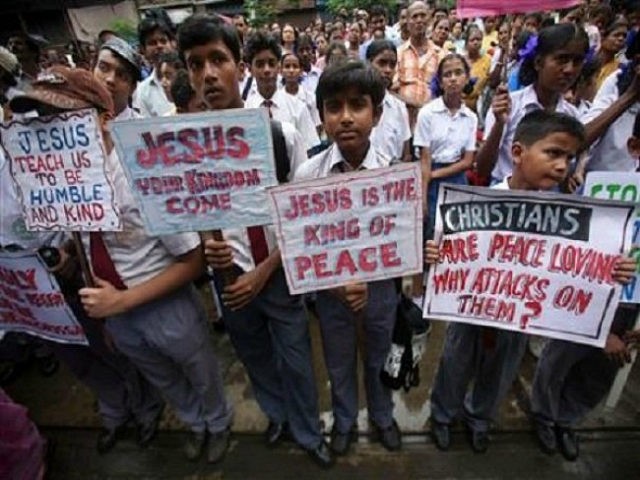India's bishops urge 'wise' voting in national election as secularism is threatened

India's Catholic bishops are urging voters to keep the world's most populous country secular, and a former Supreme Court judge has warned that becoming a Hindu state will sound the death knell of democracy in the country.
Between March and May, nearly one billion people in India will vote and pick their next national government.
The country's Catholic bishops have urged citizens "to vote wisely" to help India remain a secular and democratic republic, according to the National Catholic Reporter.
"We urge all citizens to enroll as voters and exercise their sacred duty to vote wisely so that we elect leaders who are committed to constitutional values and the uplift of the poor," said in a statement the Catholic Bishops' Conference of India issued at the end of their 36th biennial meeting.
Around 170 bishops from India's 174 dioceses attended the Jan. 31-Feb. 7 meeting in the southern Indian city of Bengaluru.
The meeting's central theme was "The Church's Response to the Current Sociopolitical Situation of the Country and the Benefits and Challenges of Artificial Intelligence (AI)."
The bishops represented India's Latin, Syro-Malabar, and Syro-Malankara rite churches.
Their meeting was held as the current federal coalition government led by the Hindu nationalist Bharatiya Janata Party (Indian People's Party) was completing its second five-year term, which ends in May.
India's 966.8 million voters will likely elect the country's 543-member Lok Sabha, or people's council, the lower house of parliament, in April and May.
In 1947, India and Pakistan were created by dividing British India.
Pakistan became an Islamic state, while India decided to become a secular republic, giving equal rights and opportunities to all its citizens.
MAKING WAY FOR A HINDU NATION
However, many fear the coming election may make way for declaring India a Hindu nation. Tushar Gandhi, the great-grandson of Mahatma Gandhi, sees such a possibility if the current coalition wins the elections.
"Secularism as a constitutional pledge will be scrapped and a monolithic state will be formed. That is definite. In that kind of a state, there is no place for democracy," Gandhi told The Hindu newspaper in October.
India's population is 79.8 % Hindu, 14.2 % Muslim, and 2.3 % Christian. In Uttar Pradesh state — India's most populous state with 230 million inhabitants — only .18% are Christian.
In December, the United Christian Forum (UCF), an ecumenical forum that monitors anti-Christian violence in the county, released a list of 687 incidents of violence against Christians from the first 334 days of 2024, according to The Catholic World Report.
The report also noted that sporadic incidents of anti-Christian violence had become endemic since BJP and Modi came to power in 2014.
While only 147 incidents of violence against Christians were reported in 2014, the UCF pointed out that incidents have leaped since then to 687 in 2023.
Former Supreme Court Judge, K.M. Joseph on Feb. 22 said that removing secularism will precipitate democracy's death in India. He said that secularism is indispensable in a democracy.
"Even if you take away secularism from the preamble, none of the features of secularism would go away. So you cannot take away Secularism from the constitution," he said.
"Secularism is absolutely indispensable in a democracy," said Jospeh
"If secularism is going to be removed by any government from the Preamble to the Constitution, under the impression that by merely removing the word 'secularism', you are removing the features of secularism...even if it is removed, it will sound the death knell of democracy."
He was referring to calls from certain quarters to remove the reference to "secularism" from the constitution.
SECULARISM EQUATED WTH EQUALITY
"Secularism is a facet of equality. If you treat all religions equally, that is secularism. You are fair; you do not bias or patronize. This is substance as held in S.R. Bommai [judgment]," he explained
"Even if you take away secularism from the preamble, none of the features of secularism would go away. So you cannot take away Secularism from the constitution," he said.
"Secularism is absolutely indispensable in a democracy. If secularism is going to be removed by any government from the Preamble to the constitution, under the impression that by merely removing the word 'secularism', you are removing the features of secularism...even if it is removed, it will sound the death knell of democracy," he said.
Joseph made the remarks while delivering a lecture at an event organized by the Kerala High Court Advocates Association. The lecture was titled "The Concept of Secularism under the Indian Constitution," LiveLaw reported.
He was referring to calls from certain quarters to remove the reference to 'secularism' from the constitution.
The former judge expressed hope that secularism will survive in India, saying, "I am still optimistic that secularism will survive. My optimism comes largely from the catholicity of the Hindu religion itself. The vast majority of the Hindus are completely broadminded and tolerant, and they do not treat religion in the manner religion is treated in other religions."
Joseph said, "The shores of this country were opened to other religions, including Christianity and Islam, when there was no war. When Islam came in the 8th century, they came as traders.
"When Christianity came, there was no army marching by their side. The shores of the country were thrown open by the kings, the priests.
"Hinduism is essentially based on the quest for universal truth at the highest level...The problem arises when it is abused, misused for the sake of politics, for the sake of gaining power. That is where the greatest danger lies," he said.